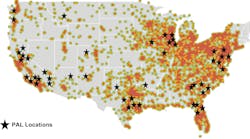Omaha, NE-based truckload carrier Werner Enterprises is particularly concerned about how the new engines will perform over time.
"Management's analysis has led to significant concerns about the reliability, fuel efficiency, cost, and warranties of the new engines," said chairman & CEO Clarence Werner. "There has been insufficient time to test a significant sample of the new engines for use in our company's fleet."
Werner said his company expects to take delivery of new trucks with pre-October engines during fourth quarter 2002, which is expected to reduce the average age of his truck fleet to about one year as of December 2002. However, he noted that the carrier plans to wait and see how the new engines perform before buying trucks equipped with them in large numbers.
"Truck purchases in 2003 will be dependent on the results of our company's further testing and analysis of the new engines, including both the EGR engine manufactured by Detroit Diesel and the ACERT engine manufactured by Caterpillar," he added.
Van Buren, AR-based truckload carrier USA Truck is also sitting on the fence in regards to purchasing trucks with the new engines.
Chairman & CEO Robert Powell said the carrier decided to extend the life of its tractor fleet during 2002 mainly because of the used tractor market depression. Yet the uncertainties surrounding the new engines may lead USA Truck to keep its older trucks even longer, depite the potential for higher maintenance costs.
"We are watching the tractor markets closely," Powell said. "While the used tractor market slowly recovers, we are beginning to see some increased maintenance costs associated with that older equipment."
Powell said the carrier intends to begin trading its oldest tractors in for new ones as soon as used-market prices meet management expectations and the new EPA-compliant engines are proven in the field.


